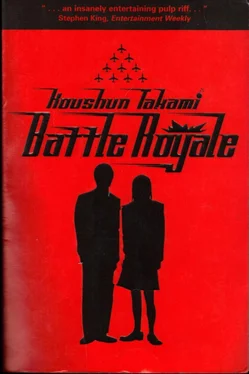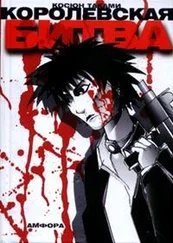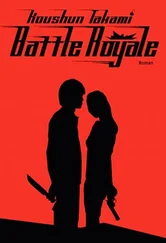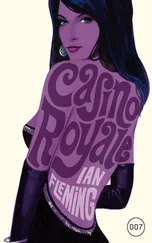Косюн Таками - Battle Royale
Здесь есть возможность читать онлайн «Косюн Таками - Battle Royale» весь текст электронной книги совершенно бесплатно (целиком полную версию без сокращений). В некоторых случаях можно слушать аудио, скачать через торрент в формате fb2 и присутствует краткое содержание. Жанр: Боевая фантастика, на английском языке. Описание произведения, (предисловие) а так же отзывы посетителей доступны на портале библиотеки ЛибКат.
- Название:Battle Royale
- Автор:
- Жанр:
- Год:неизвестен
- ISBN:нет данных
- Рейтинг книги:4 / 5. Голосов: 1
-
Избранное:Добавить в избранное
- Отзывы:
-
Ваша оценка:
- 80
- 1
- 2
- 3
- 4
- 5
Battle Royale: краткое содержание, описание и аннотация
Предлагаем к чтению аннотацию, описание, краткое содержание или предисловие (зависит от того, что написал сам автор книги «Battle Royale»). Если вы не нашли необходимую информацию о книге — напишите в комментариях, мы постараемся отыскать её.
Battle Royale — читать онлайн бесплатно полную книгу (весь текст) целиком
Ниже представлен текст книги, разбитый по страницам. Система сохранения места последней прочитанной страницы, позволяет с удобством читать онлайн бесплатно книгу «Battle Royale», без необходимости каждый раз заново искать на чём Вы остановились. Поставьте закладку, и сможете в любой момент перейти на страницу, на которой закончили чтение.
Интервал:
Закладка:
From the back of the bus, Shuya watched his forty-one classmates, who were illuminated by dull fluorescent lights fixed in dingy ceiling panels. They were all in the same class from last year. They were all still excited and chatting away, since hardly an hour had passed since their departure from their hometown of Shiroiwa. Spending the first night of a study trip on a bus seemed a little cheap. Worse yet, it felt like they were going on a forced march. But everyone would calm down once the bus crossed the Seto Bridge and got on the Sanyo Highway and headed towards their destination, the island of Kyushu.
The loud students at the front who were sitting around their teacher Mr. Hayashida were girls: Yukie Utsumi (Female Student No. 2), the class representative who looked good with braided hair; Haruka Tanizawa (Female Student No. 12), her volleyball teammate who was exceptionally tall; Izumi Kanai (Female Student No. 5), the preppy whose father was a town representative; Satomi Noda (Female Student No. 17), the model student who wore wire-rimmed glasses which suited her calm, intelligent face; and Chisato Matsui (Female Student No. 19), who was always quiet and withdrawn. They were the mainstream girls. You could call them "the neutrals." Girls tended to form cliques, but there weren't any particular groups that stuck out in Shiroiwa Junior High School's Third Year Class B, so categorizing them didn't seem right. If there was a group, it was the rebel or—to put it more bluntly—the delinquent group led by Mitsuko Souma (Female Student No. 11). Hirono Shimizu (Female Student No. 10) and Yoshimi Yahagi (Female Student No. 21) rounded out that bunch. Shuya couldn't see them from where he was sitting.
The seats right behind the driver were slightly raised, and popping up above them were the two heads of Kazuhiko Yamamoto (Male Student No. 21) and Sakura Ogawa (Female Student No. 4), the most intimate couple in the class. Maybe they were laughing, because their heads shook slightly. They were so insular, the most trivial thing could have been entertaining them.
Closer to Shuya, lying in the aisle, was a large school uniform. It belonged to Yoshio Akamatsu (Male Student No. 1). He was the biggest kid in the class, but he was the timid type, the kind of kid who always end up the target of pranks and insults. His big body was crouched over, and he was busy playing a handheld video game.
Also in the aisle were the jocks Tatsumichi Oki (Male Student N3 1. handball team), Kazushii Niida (Male Student No. 16, soccer team), and Tadakatsu Hatagami (Male Student No. 18). They were all sitting together. Shuya himself had played Little League baseball in elementary school and was known as a star shortstop. Actually he'd been friends with Tadakatsu, but they'd stopped hanging out. Partly this was because Shuya had stopped playing baseball, but it also had to do with the fact that Shuya had started playing electric guitar, which was considered an "unpatriotic" activity. Tadakatsu's mother was uptight about that sort of thing.
Yes, rock was outlawed in this country. (Of course there were loopholes. Shuya's electric guitar came with a government-approved sticker which read, "Decadent Music Is Strictly Prohibited." Decadent music was rock.)
Come to think of it, Shuya thought, I've changed my friends too.
He heard someone laugh quietly behind big Yoshio Akamatsu. It was one of Shuya's new friends, Shinji Mimura. Shinji had short hair and wore an intricately designed ring on his left ear. By the time Shuya and Shinji became classmates in their second year, Shuya had already heard of him. Shinji was known as "The Third Man"—the team's first-string shooting guard. His athletic skill was equal to Shuya's, though Shinji would have said, "I'm better, bro." Together on the basketball court for the first time in their second-year class competition, they made for a deadly combo, so it was only natural they'd hit it off. There was a lot more to Shinji than sports, though. His grades in subjects other than math and English weren't great, but his breadth of real world knowledge was incredible, and his views were mature, way beyond his peers. He somehow had an answer for any question about overseas information that couldn't be obtained in this country. And he always knew the best thing to say when you were down, like, "You know it, I'm the man." But he was never arrogant. Instead he'd smile and crack a joke. He was never full of himself. Basically Shinji Mimura was a good guy.
Shinji appeared to be sitting next to his buddy from grade school, Yutaka Seto (Male Student No. 12), the class clown. Yutaka must have cracked another joke, because Shinji was laughing.
Hiroki Sugimura (Male Student No. 11) sat behind them. His tall, lanky body barely fit into the narrow seat. He was reading a paperback book. Hiroki was reserved and studied martial arts, so he projected toughness. He didn't hang out with the other guys much, but once you got to know him a little he turned out to be nice. He was just shy. Shuya got along with him. Was he reading that book of Chinese poetry he liked so much? (Chinese books in translation were fairly easy to obtain, not surprising considering the Republic claimed China as "part of our homeland.")
Shuya once came across a line in an American paperback novel he'd dug out from a used bookstore (he managed to get through it with a dictionary): friends come and then they go. Maybe that's how things were. Just as he and Tadakatsu were no longer friends, there might come a time when he wasn't friends with Shinji and Hiroki anymore.
Well, maybe not.
Shuya glanced at Yoshitoki Kuninobu, who was still digging through his bag. Shuya had made it this far with Yoshitoki Kuninobu. And that would never change. After all they were friends ever since they wet their beds at that Catholic institution with the bombastic name, "the Charity House"—where orphans or other children who, due to "circumstances," were no longer able to be with their parents. You could say they were almost cursed to be friends.
Maybe we should cover religion while we're at it. In fact this country, under a unique system of national socialism ruled over by an executive authority called "the Dictator" (Shinji Mimura once said with a grimace, "This is what they call 'successful fascism.' Where else in the world could you find something so sinister?"), had no national religion. The closest thing to religion was faith in the political system—but this wasn't paired up with any established religion. Religious practice therefore was permitted as long as it remained moderate and at the same time wasn't guaranteed. So it was only practiced in private by dedicated followers. Shuya himself never really had any religious inclinations, but it was thanks to this particular religion's institution that he managed to grow up relatively unscathed and normal. He thought he should appreciate that much. There were state orphanages, but apparently their accommodations and programs were poorly run, and from what he heard they served as training schools for Special Defense Forces soldiers.
Shuya turned around and looked back. The group of delinquents that included Ryuhei Sasagawa (Male Student No. 10) and Mitsuru Numai (Male Student No. 17) was sitting on the wide seat at the back of the bus. There was...Shuya couldn't see his face, but he could see between the seats the head with the oddly styled, slicked-back, long hair poking out by the right window. Though on its left side (well, it seemed Ryuhei Sasagawa had left two seats open in between) the others were talking and laughing over something dirty, the head remained absolutely still. Perhaps he'd fallen asleep. Or maybe like Shuya he was watching the city lights.
Shuya was completely baffled by the fact that this boy— Kazuo Kiriyama (Male Student No. 6)—would actually participate in a childish activity like a study trip.
Читать дальшеИнтервал:
Закладка:
Похожие книги на «Battle Royale»
Представляем Вашему вниманию похожие книги на «Battle Royale» списком для выбора. Мы отобрали схожую по названию и смыслу литературу в надежде предоставить читателям больше вариантов отыскать новые, интересные, ещё непрочитанные произведения.
Обсуждение, отзывы о книге «Battle Royale» и просто собственные мнения читателей. Оставьте ваши комментарии, напишите, что Вы думаете о произведении, его смысле или главных героях. Укажите что конкретно понравилось, а что нет, и почему Вы так считаете.








![Косюн Таками - Королевская битва [litres]](/books/411414/kosyun-takami-korolevskaya-bitva-litres-thumb.webp)



